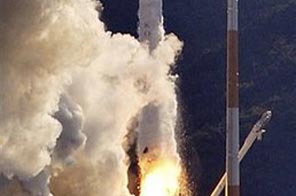SKorea launches first rocket
GOHEUNG: South Korea's first rocket blasted off into space Tuesday following an aborted attempt last week and just months after its rival North Korea drew international ire for its own launch.
A problem quickly surfaced, however, when space officials said that an initial investigation showed that the satellite the rocket was carrying apparently failed to enter its intended orbit.
Science and Education Minister Ahn Byong-man told reporters that South Korean and Russian scientists were looking into the problem. It was not immediately clear whether the problem jeopardizes the success of the launch.
The launch of the two-stage Naro rocket could boost the country's space ambition but the North warned it would keep a close eye on the international response to Seoul's launch.
South Korea initially planned to launch the rocket in late July but delayed it several times due to technical glitches. Last Wednesday, the country aborted the launch plan just minutes before the scheduled blast off.
But Tuesday the rocket lifted off from the country's space center on Oenaro Island, about 290 miles (465 kilometers) south of Seoul, around 5 p.m. (0800 GMT, 4 a.m. EDT).
It is South Korea's first launch of a rocket from its own territory. Since 1992, it has launched 11 satellites, all on foreign-made rockets sent from overseas sites.
The rocket, built with Russian help, was carrying a domestically built satellite aimed at observing the atmosphere and ocean.
South Korean officials hope the rocket will boost the country's aim to become a regional space power, along with China, Japan and India. North Korea, however, has warned it would "closely watch" how the U.S. and other neighboring countries respond to the South's launch.
In April, the North claimed it launched a multistage rocket it said was mounted with a satellite. The U.S., Japan and other nations condemned the launch as a test of ballistic missile technology since the same rocket can be mounted with a warhead.
The North, unlike the South, is banned from ballistic missile activity by Security Council resolutions as part of international efforts to eliminate its nuclear and long-range missile programs, which are seen as a threat. After the April launch, the Council slapped Pyongyang with new sanctions for the breach.
In recent weeks, the North has significantly softened its stance toward the South, freeing a South Korean worker held there for more than four months, agreeing to lift restrictions on border crossings and pledging to resume joint projects and the reunion of families separated during the Korean War.






